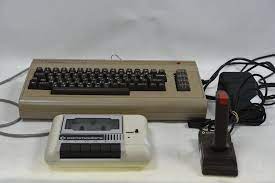
Commodore 64 Original for Sale
If you’re a vintage computer enthusiast or a collector looking to own a piece of computing history, you’ll be excited to know that an original Commodore 64 is now available for sale. The Commodore 64, released in 1982, is one of the most iconic and best-selling home computers of all time.
This particular Commodore 64 being offered for sale is in excellent condition and comes with its original peripherals, including the classic beige keyboard, joystick, and power supply. Whether you want to relive the nostalgia of early computing or add a unique piece to your collection, this original Commodore 64 is sure to delight.
Despite its age, the Commodore 64 remains a beloved piece of technology that holds a special place in the hearts of many computer enthusiasts. Its groundbreaking graphics and sound capabilities revolutionized the gaming industry and set new standards for home computing.
If you’re interested in owning this piece of computing history, don’t miss this opportunity to acquire an original Commodore 64. Act fast before it’s gone!
For more information about pricing and availability, please contact us at info@commodorehistory.com.
Uncovering the Value and Legacy of the Commodore 64: Worth, Ownership, Affordability, and Record-Breaking Sales
- How much is an original Commodore 64 worth?
- Who owns Commodore 64 now?
- Why was the Commodore 64 so cheap?
- What is the best selling computer of all time?
How much is an original Commodore 64 worth?
The value of an original Commodore 64 can vary depending on factors such as its condition, whether it comes with original peripherals, and the current market demand for vintage computers. Generally, a well-maintained Commodore 64 with all its original components can fetch a higher price among collectors and enthusiasts. Prices for an original Commodore 64 typically range from around $50 to several hundred dollars or more, with rare editions or those in mint condition commanding higher prices. It’s recommended to research recent sales and listings to get a better idea of the current market value of an original Commodore 64 before making a purchase or sale decision.
Who owns Commodore 64 now?
The ownership of Commodore 64 has changed hands multiple times since its original release in 1982. As of the latest information available, the rights to the Commodore brand are held by various entities, with different companies owning different aspects of the brand, including trademarks and intellectual property. The current ownership structure is complex, with no single entity exclusively owning Commodore 64 as a whole. It’s important to note that while the original company Commodore International no longer exists in its original form, the legacy of the Commodore 64 lives on through various products and initiatives associated with the brand.
Why was the Commodore 64 so cheap?
The Commodore 64 was able to achieve a relatively low price point compared to other computers of its time due to several factors. One key reason for its affordability was Commodore’s vertically integrated manufacturing process, which allowed them to control costs more effectively. Additionally, the use of off-the-shelf components and economies of scale in production helped drive down the overall cost of the Commodore 64. By offering a powerful and versatile computer at a competitive price, Commodore was able to attract a wide audience and establish the Commodore 64 as a popular choice for home computing enthusiasts.
What is the best selling computer of all time?
One of the most frequently asked questions in the realm of computing history is: “What is the best-selling computer of all time?” The answer to this question lies with the iconic Commodore 64. Released in 1982, the Commodore 64 quickly became a household name and went on to claim the title of the best-selling computer of all time. Its affordability, impressive capabilities, and extensive software library made it a favorite among users worldwide. Even today, the Commodore 64 holds a special place in the hearts of many computer enthusiasts and collectors as a true symbol of the golden age of home computing.
